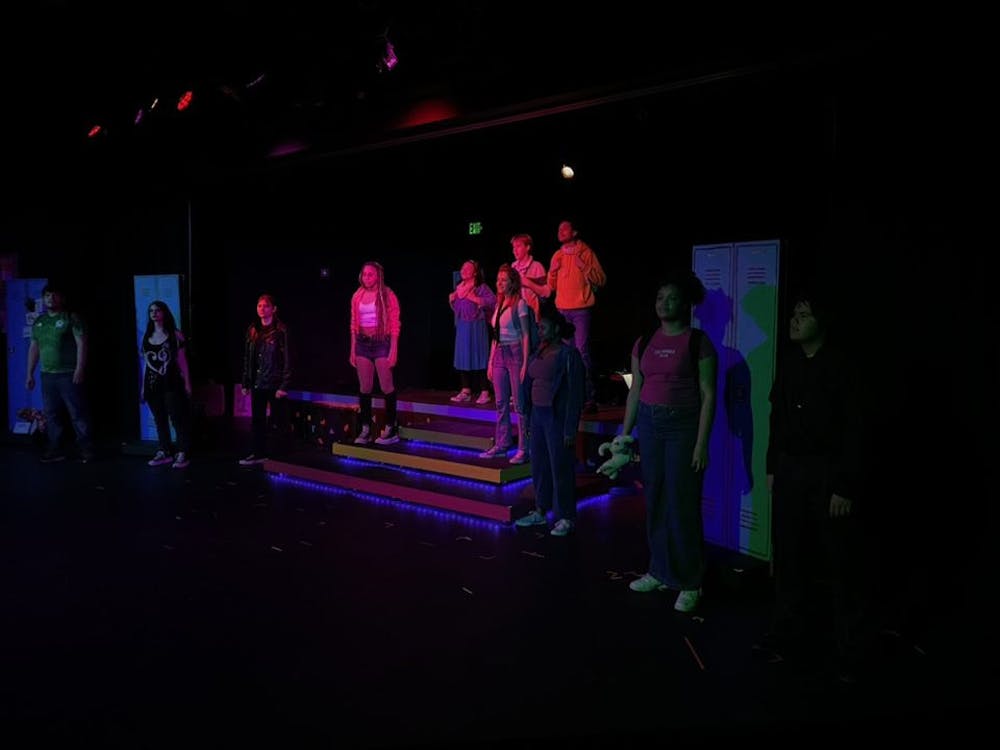The small, fifth-floor theater in the H & H building is cozy, to say the least. The first row of chairs rest on the floor of the tiled stage, and the actors share a bathroom (no locks on the doors) with the audience members. There is a brown cat strutting around the light board, which is situated amongst the rows of seating.
Overall, the Annex Theater’s production of Peter Shaffer’s classic play, Equus, did not unfurl itself in a traditional theater space.
In fact, it did not use a theater at all. Instead, this community-built company took over a loft-apartment for the past four weekends and converted it into an intimate arena in which to set their minimalist take on this classic play. The slightly cramped quarters felt appropriate for this production.
It was clear from the beginning of the play — in which the entire cast enters, naked, and proceeds to dress silently before exiting again — that the audience was being invited into a world of ultimate exposure and vulnerability. Even once the costumes had been donned, the tiny theater space managed to perpetuate this sense of raw humanness. In such a miniscule room, there is no avoiding one’s eyes or hiding amongst the anonymity of a large audience.
Junior Jake Budenz led the production gracefully as Alan Strang, a troubled teenager obsessed with horses. After blinding six of these animals, Alan is condemned to therapy with a frustrated but understanding psychiatrist, Martin Dysart (Rjyan Kidwell). Budenz’s vibrant energy enticed the audience as he swung from bouts of wild-eyed mania to fearful moments of childlike anxiety, verbally jousting all the while with Kidwall.
Dysart provides the narratorial voice of the play for the audience as he struggles to cure Alan of his destructive passion for horses. Kidwall performed with his own brand of frenzied energy, spitting words across the stage and shouting at the audience. His mania made it difficult at times to buy his character’s frustration at being nothing but a meek and quiet husband caught in a sterile marriage.
Despite this, Kidwall’s moments of psychological reflection stood out for their conversational and honest quality, and they provided an elegant roadmap amongst the psychological tangle of Alan’s mind.
The challenge of presenting such complicated psychodrama in a scaled-down space, like the H & H building, can only be combated with strong directorial decisions and a wholehearted commitment to minimalism. In some ways, director Mason Ross rose valiantly to the challenge, making such bold choices as creating a dynamic space in which location flows seamlessly from doctor’s office to psych ward to childhood home, or by utilizing offstage actors to make the oftentimes eerie and guttural sound effects with their own voices.
Features like these lent themselves nicely to a homemade sensibility for the production. Despite this creative stagecraft, certain choices seemed questionable and made the production feel self-conscious. Why were some props real objects, and other only pantomimed? Why were British accents abandoned, but English slang left in the script? Why were certain artistic decisions, such as the employment of projections and later the use of humans as furniture, included only minorly and half-heartedly throughout the production?
One theme that the Annex Theater was entirely unafraid to thoroughly delve into was the sexuality of Shaffer’s text. Like any good psychodrama, Equus makes sure to explore themes of unconscious sexual desire and Freudian family issues.
Ross’s production confronted this subject matter head on, though sometimes to such an extreme it felt heavy-handed. The homoerotic nature of Alan’s strange dreams became overly-blatant as Budenz practically penetrated the stage while describing these already sexualized nightmares. A horse head strap-on was used at one point, and every erotic metaphor was highlighted by the actors. The company seemed to be surrounding the moments of sexuality with neon lights, instead of letting Shaffer’s expertly crafted text speak for itself.
However, it should be noted that the company impressively handled the nudity called for by the play. Sex and nakedness onstage is frequently presented poorly or distastefully in contemporary theatre. It oftentimes does nothing but draw the audience out of the world of the play, causing them to think only of the actors’ comfort, what the elderly man sitting nearby is thinking and so on.. Watching people take their clothes off in a public location can make audiences antsy.
The Annex Theatre artfully combated this challenge by simply making nudity a constant presence in the production. From the second the play began, actors onstage were naked, and this continued on through much of the performance.
By the time any significant sexual action was occurring, the audience was so used to the nudity that they were not made self-conscious. Instead, the viewers were able to remain fully invested and focused within the play itself.
There is no question that Equus is a risky choice for any theatre company.
It requires extreme commitment from everyone involved, and it can sometimes come across as tired or dated, as it was written in the 1970s.
However, the Annex Theatre stood up to the challenge and managed to revive the piece in a minimalist and incredibly intimate performance. Despite a smattering of odd artistic choices, in the end, the production managed to gracefully fill the H & H building with moving storytelling and a fresh take on a classic play.






















Please note All comments are eligible for publication in The News-Letter.